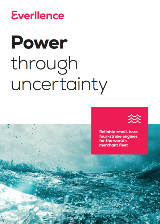
Everllence small-bore portfolio
Everllence (former MAN Energy Solutions) has built its position as the leading designer and developer of small-bore engines for the world’s merchant marine fleet on the basis of high reliability and efficiency.
Thanks to the low maintenance requirements, our engines provide extended lifetime, and additionally offer long time between overhauls (TBO). When needed, our service experts are there for you – every day and everywhere around the world.
For the world's merchant fleet
Our portfolio of proven and trusted four-stroke small-bore GenSets and engines is suitable for many different kinds of merchant vessels, and also specific applications. This makes it a perfect choice for power generation, diesel-electric propulsion and propulsion.
By loading the video you agree to YouTube's privacy policy.
High efficiency
Efficient performance has a measurable effect on both the environment and your bottom line. It also explains why more than 20,000 of our engines are in service worldwide. Our dual-fuel engines let you select the most economic fuel type for the operating conditions. The cost-optimized fuel injection system is also designed for high reliability and cost-efficiency.


Key benefits of the small-bore engines
Our small-bore GenSets and propulsion engines are based on proven technology, and offer a wide range of benefits:
- Designed for lifelong operational reliability, availability and minimal downtime
- Robust design with sturdy engine blocks, stiff crankshafts, and robust connecting rods
- Long overhaul intervals
These key features make all engines of this portfolio a good choice for shipowners or operators focusing on reliable performance and efficiency.
Talk to our experts
Plan your vessel with confidence
Get in touch with our four-stroke small-bore experts for in-depth advice on all your propulsion and GenSet questions. Start your change process now and reach out to us today.

Future-proof solutions
The main uncertainties affecting engine choice have to do with the environmental and cost factors of fuel. Our answer is flexibility. Our single-fuel engines can run on conventional fuel types and also bio-fuel oils. Dual-fuel engines let you use methane as additional fuel type. The L21/31DF-M and L27/38DF-M can use methanol as second fuel type. Our retrofitting expertise offers flexibility, now and in the future.

Frequently asked questions regarding the Everllence small-bore engines
What else is there to know about these engines?
Core questions on performance, fuel, and emissions answered.
The small-bore portfolio also includes a range of trusted and proven propulsion engines for smaller applications, such as tugs and fishing vessels.

Discover the full range of Everllence four-stroke small-bore engines
GenSets

The dual fuel L28/32DF (former MAN L28/32DF) is available for new builds and economical retrofit solutions. The dual fuel engines offer flexibility with economic and environmental advantages, especially as part of a complete power package.
- 720 – 750 rpm
- 1,050 – 1,890 kW
- 1,000 – 1,800 kWe

The L27/38DF-M (former MAN L27/38DF-M) GenSet is designed for running on methanol, heavy fuel oil (HFO), and most biofuel oils. It delivers exceptional performance across the entire load range, featuring quick acceleration and immediate load response. Long time between overhauls (TBO) are also valid for the L27/38DF-M.
- 720 – 900 rpm
- 1,980 – 3,690 kW
- 1,900 – 3,540 kWe

L27/38 Mk2 (former MAN L27/38 Mk2) GenSets are designed for operational reliability together with long and safe overhaul intervals. They are a proven solution for a large range of merchant vessels.
- 720 – 900 rpm
- 1,980 – 3,690 kW
- 1,900 – 3,540 kWe

The Mk3 version of the L23/30H (former MAN L23/30H) GenSet combines innovative technology with proven design principles to meet current and future requirements. With up to 200 kW per cylinder, it is engineered to cater for the power needs of most commercial ship types.
- 720 – 900 rpm
- 500 – 1,800 kW
- 475 – 1,710 kWe

The dual fuel L23/30DF (former MAN L23/30DF) is available for new buildings as well as for an economical retrofit solution. The dual fuel engines offer flexibility with economic and environmental advantages, especially as part of a complete power package.
- 720 – 900 rpm
- 625 – 1,320 kW
- 590 – 1,255 kWe

This methanol-fuelled L21/31 (former MAN L21/31) GenSet is a compact and reliable power source designed to run on methanol, heavy fuel oil (HFO), and most biofuels.
With its outstanding load-step capabilities and extremely long time between overhauls (TBOs), it is ideal for many different applications. It is also a perfect match for the Everllence B&W ME-LGIM (former MAN B&W ME-LGIM) methanol two-stroke engine.
- 900 – 1,000 rpm
- 1,000 – 1,980 kW
- 950 – 1,880 kWe

L21/31 Mk2 (former MAN L21/31 Mk2) GenSets deliver reliable and HFO- / biofuel-based auxiliary power. They operate at the lowest possible accumulated costs during their entire life cycle and therefore represent a safe investment.
- 900 – 1,000 rpm
- 1,000 – 1,980 kW
- 950 - 1,880 kWe
Propulsion engines

The L27/38 (former MAN L27/38) propulsion engine, with its output range of 2,100 to 3,690 kW, is the perfect power solution for many different kinds of marine vessels.
These include not only small to medium-sized tankers, cargo vessels, ferries, passenger and RO-RO ships, coasters, large fishing boats but also tugs, workboats, and supply vessels.
- 750 – 900 rpm
- 2,100 – 3,690 kW

The L21/31 engine is the ideal power source in the 1,290 – 1,935 kW output range for small to medium sized tankers, cargo vessels, ferries, RO-RO vessels, fishing vessels, tugs, workboats, and supply vessels.
- 1,000 rpm
- 1,290 – 1,935 kW
Downloads
Get more insights on our small-bore engines

Power through uncertainty
Our portfolio of small-bore four-stroke GenSets for auxiliary and propulsion applications is constantly evolving to meet the requirements from the maritime industry. Do you want to stay on top of this? Then watch the recording of this Everllence ExpertTalk.


Discover our methanol-fuelled small-bore engines: L21/31DF-M and L27/38DF-M.

Engineers in Denmark are making shipboard power low-emission with the developing of a four-stroke methanol engine.

The global fleet of wind turbine installation vessels (WTIVs) is still small, even as demand for larger, more powerful turbines grows. Check out our latest Discover article featuring Cadeler's new heavy lifter.

The demand for efficient and competitive engine designs for the Offshore Wind segment is increasing, and a large proportion of the construction of specialized vessels is taking place in China.
